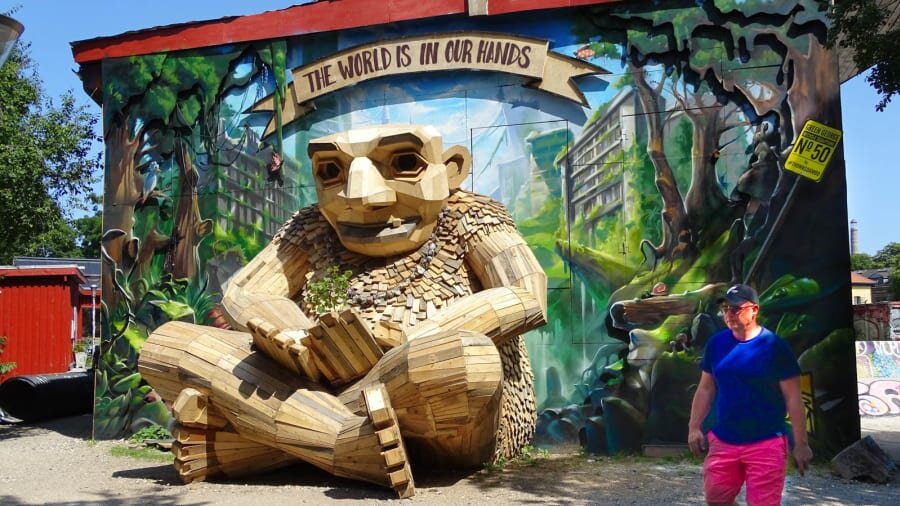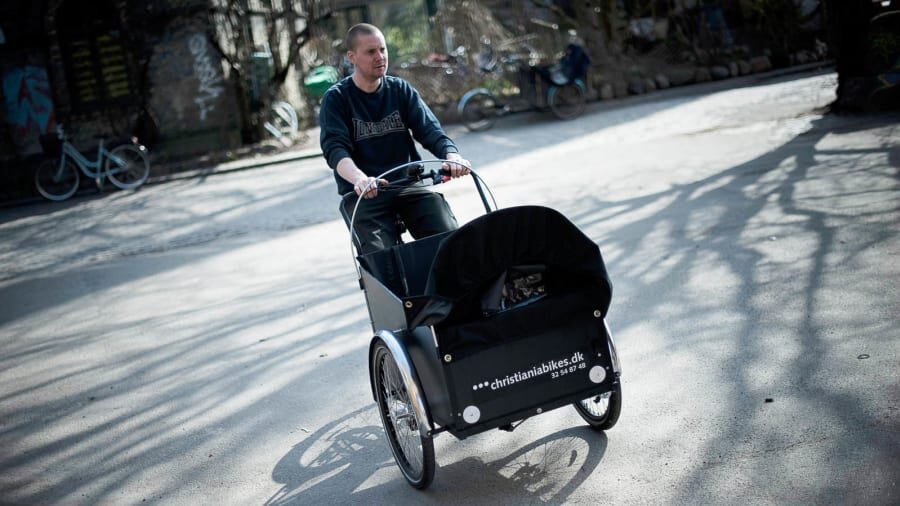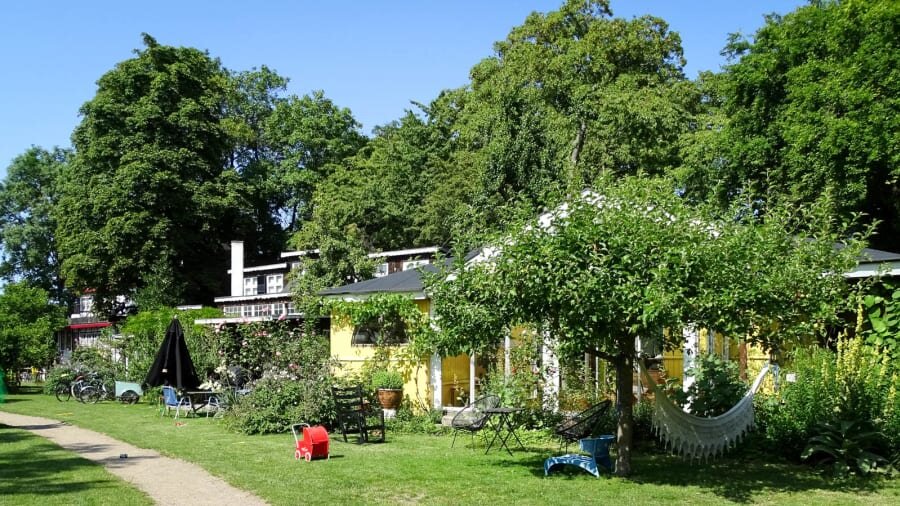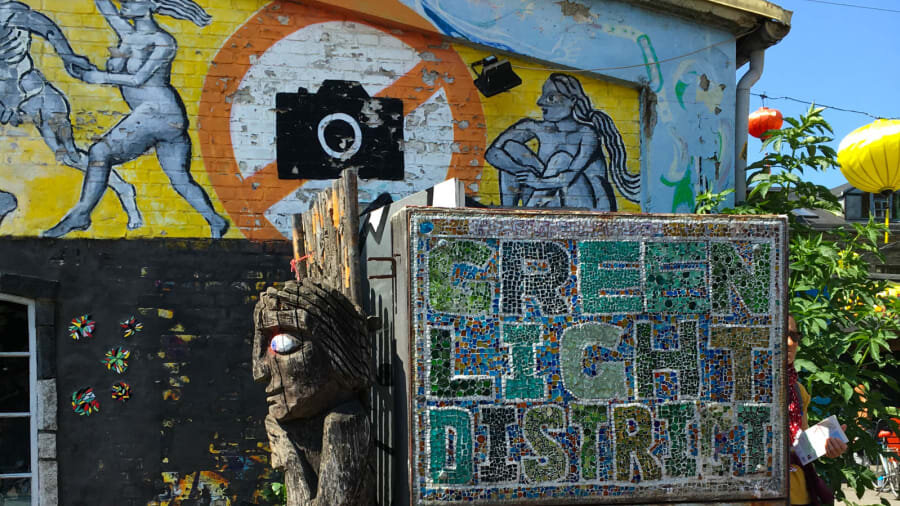What is a "Nowtopia"? People building community out of practices that counter the current order. Like Copenhagen's Christiania




A fascinating report on Open Democracy about Freetown Christiania, an ex-military barracks outside Copenhagen which (over the last half century) has become a byword for economic and social self-organisation:
In the face of intensifying ecological and social crises, the world is in need of many transformative changes, not least a profound imaginative shift. Decades of conditioning and normalisation have made it seem as though there is no alternative to capitalism, even if it leaves us exploited and bereft from both each other and ‘nature’. If we know where and how to look, however, there are whole undercurrents of social life which show us that capitalism isn’t the natural state of things, and that other worlds are possible in the here and now.
When you step across the threshold of Freetown Christiania, in the centre of Copenhagen, for instance, everything seems to change. The frenetic urban atmosphere loosens, the noise of traffic fades, time slows to a walking pace. Smells become more vibrant, brighter colours emerge, and a wilder nature creeps in.
The social theorist Murray Bookchin once said that “Any society that seeks to create utopia will not only be a society that is free, it also has to be a society that is beautiful.” As you cross this threshold, just a five-minute cycle from the Danish national parliament, his words take on a renewed significance.
Christiania is a famous and controversial experiment in resistance, persistence and self-rule which sits on a squatted former military base. Founded in 1971, and thus soon to celebrate its 50th birthday, the site is home to almost 1,000 people.
However, despite attracting half a million tourists per year, and being one of the most-visited sites in Denmark, it remains poorly understood by the outside world. For many, it remains primarily associated with Pusher Street, a thriving open hash market which takes place on its land.
In 2019, I stayed at Christiania as a Researcher in Residence, investigating the dynamics of its living community economy beyond the attention that Pusher Street overwhelmingly receives. I found a richness to everyday economic life in the community which has rarely received the attention it deserves, and left seeing the Freetown as a prime example of a Nowtopia [PDF paper here].
That is, with whatever obstacles they may face, and whatever imperfections exist, residents (known as Christianites) continue to practice an envisioned ideal of democratic economy and society, in the here and now.
Christiania has long pioneered a more ecological way of life, with a minimum of formal rules, and its DIY urbanism operates in accordance with three fundamental principles:
Self-administration and responsibility
Solidarity
Balance with nature
More here, where each of these principles is illustrated with a detailed account of Christiania’s practices and traditions - very much worth reading.
But we noticed this neologism, “Nowtopia”, and have tracked it down to a 2010 book (with this title) by the SF technology activist Chris Carlsson (available on AK Press). Here’s the supporting blog, and below, the blurb:
Nowtopia is a book about a new politics of work. It profiles tinkerers, inventors, and improvisational spirits who bring an artistic approach to important tasks that are ignored or undervalued by market society […]
Outlaw bicycling, urban permaculture, biofuels, free software, even the Burning Man festival, are windows into a scarcely visible social transformation that challenges politics as we know it. As capitalism continues its inexorable push to corral every square inch of the globe into its logic of money and markets, new practices are emerging that are redefining politics […]
In myriad ways, people are taking back their time and technological know-how from the market and in small under-the-radar ways, are making life better right now. In doing so, they also set the foundation—technically AND socially—for a genuine movement of liberation from market life.
The social networks thus created, and the practical experience of cooperating outside of economic regulation, become a breeding ground for new strategies and tactics to confront the everyday commodification to which capitalism reduces us all.
Nowtopia uncovers resistance and rebellion amidst fractions of a slowly recomposing working class in America. Rarely self-identifying as mere ‘workers,’ people from all walks of life are doing incredible amounts of work in their “free” “non-work” time. This unpaid work is creating immediate practical improvements in daily life.
More interesting still, these myriad initiatives constitute a more thorough-going refusal of politics and economics as usual […] The practical rebellions outlined in this book embody a deeper challenge to the basic epistemological underpinnings of modern life, as a new ecologically-driven politics emerges from below to reshape our assumptions about science, technology and human behaviour.
The semi-conscious war between these life-affirming, self-emancipating behaviors and the coercive domination of money, property, and survival amidst contrived scarcity is the core investigation of this book.
Nothing new under the sun, it seems… Or perhaps it’s fascinating that Carlsson saw in 2010 the early signs of the field of practice and initiatives that we’ve been covering in A/UK for the last three years.
In terms of urging us to see old activities in new frames, and value new social realities, it reminds us of the powerful book on commoning, Free Fair and Alive, that we covered a few months ago here.

